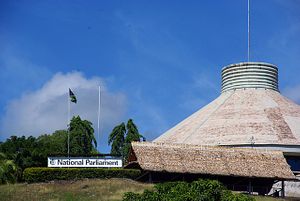Prior to winning its independence in 1978, the Solomon Islands was simply a chain of islands operating under different traditional and unwritten sets of norms and values. One thing the islands did have in common, however, was leadership, even if the approach varied slightly among the different societies.
The Melanesian leadership concept known as the “Big Man” system was always evident, but there is always a misunderstanding of the role the leader played, whether a paramount leader or a tribal chief inheriting his power and authority. The former gains recognition through influence while the latter enforces power and authority through a sovereign form of process.
Upon gaining independence, a newly foreign type of leadership concept was introduced to the Solomon Islands, without any chance for a proper assessment. The Westminster parliamentary democracy was established under the Solomon Islands 1978 Constitution and remains the political system used in the country.
Although tribal wars between some of the islands did occur, by and large leadership and politics during the pre-independence era was stable, with the people respecting an authority that was directly responsible for their subordinates. This stability changed with the imposition of an open democratic electoral system.
Today, Solomon Islands still maintain the traditional leadership system in rural areas but it is rarely effective in practice. People tend to see their local members of parliament as their savior, someone they choose so that they can be assisted in return.
This Westminster system combined with the electoral process has created a broad political spectrum whereby competition for leadership within the hierarchy of the system becomes never-ending. Parliamentarians push their own agenda, in a constant power struggle. People are no longer seen as citizens but as servants of the crown, with less pride in their national identity, but prepared to give blood and sweat for the sake of their tribal identity.
The concept of power struggle in the Solomon Islands context is both awkward and damaging. For one thing, political leaders tend to quickly forget their mandates, instead pushing their own agenda. Second, the constant power struggles have proven to be a huge distraction. Instead of doing what they were elected to do, the government is more obsessed with maintaining its numbers.
The power struggles become particularly threatening when they begin to involved ethnic groups of special interests. When this happens, it weakens the very foundation of the Solomon Islands as an integrated state of multiple islands, and it can result in fragmented political interests that can lead to even greater instability and tension.
The majority of Solomon Islanders are tired of hearing of “no-confidence” motions. These motions are of course part of the process but it interrupts the progress of any state or society. Solomon Islands is very susceptible to this practice and we have seen governments change without being given a chance to act on their mandates. This has resulted in negative economic outputs, a weak political system, poor social services, and declining living standards for the entire population.
Ultimately, it comes back to the system. Is the electoral system the best tool for solving these challenges? The answer is a definite no. Is the Westminster system the best tool for solving these challenges? The answer is again no. Then why after 37 years of independence do we still embrace such a system? That goes back to our political system and its navigators, the legislature and its parliamentarians. Changing the system is the only solution for genuine transformation in the country, and in saying this citizens must be proactive and play an important role in the process. Although it is a stretch to think that it could return to its traditional leadership system, Solomon Islands could surely at least revisit its traditional concept of leadership and try to create an applicable hybrid model that could be tested carefully before it is adopted.
Walter Diamana is a serving diplomat in the Solomon Islands foreign service. He has an academic background in international relations and diplomacy. Wea rod ya bae lidim iumi is Pidgin and means “Where this road will lead us.”

































